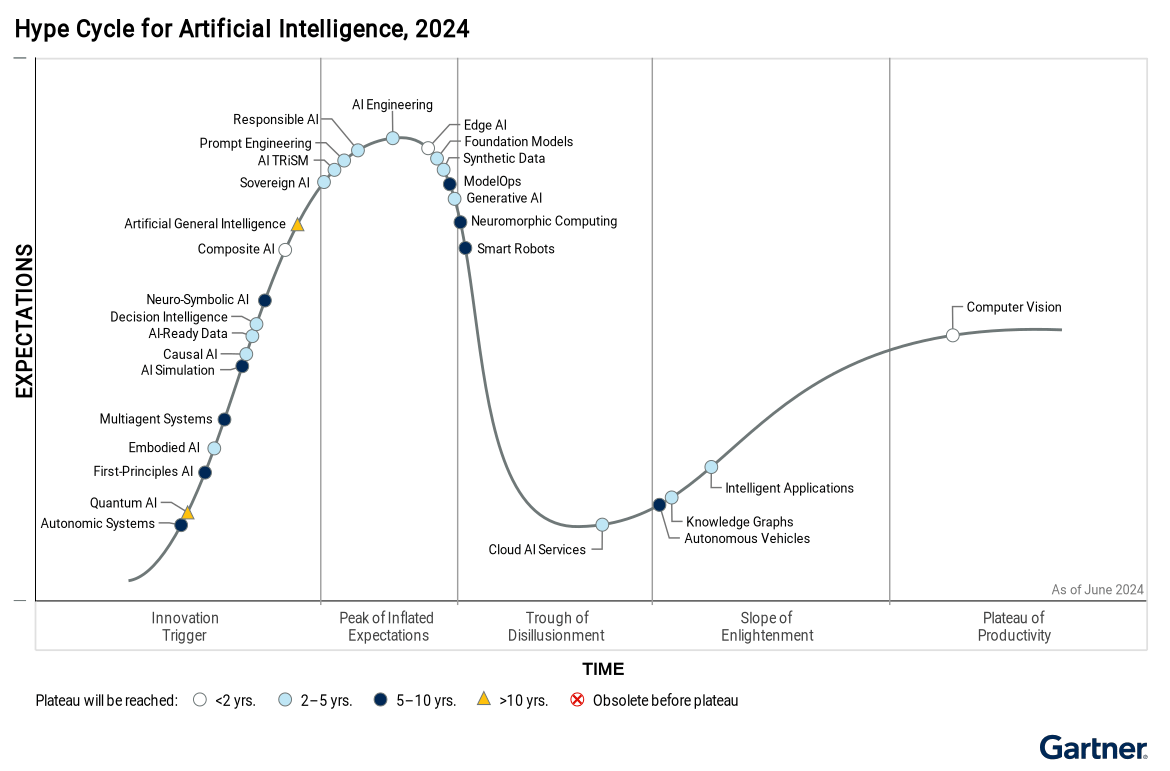
Image Created with DALL-E 3
Hate Longscrolling? Jump Around!
Hi all. This week we ponder whether the hype has peaked on gAI, see how PBS Utah uses AI to customize audience experiences, and finally, we hear the future of AI Michaels’ Olympic coverage. But first…
Autumn Tactics
Last week I promised you more info our the Public Media Innovators autumn 3rd Thursday webinar series. First, on August 15, at 1pET/10PT we have: Adobe + AI: Practical Applications for Public Media, featuring Brooke Hopper, Principal Designer of Machine Intelligence & New Technology at Adobe.
In this session, Brooke will delve into the current state of generative AI in the creative fields, exploring the transformative impact of machine learning on the media industry. Attendees will be treated to a detailed demonstration of various use cases within the Adobe Creative Cloud ecosystem, showcasing the practical applications and innovative potential of these cutting-edge technologies.
Additionally, Brooke will provide valuable insights into how to ethically and effectively integrate these new tools into your workflow, addressing common challenges and offering best practices. This webinar is an essential opportunity for public media practitioners eager to stay ahead of the curve and harness the power of AI and machine learning in their work.
We first encountered Brooke at SxSW during her session, Creativity in Flux: Art & Artificial Intelligence. You may recall that this one came up during our SxSW recap webinar in March, as one of the sessions that created real impact amongst the attendees from public media. You can listen to that session here, and interact with Brooke directly next month. Register now!
Then on September 19 at 1pET/10aPT, we have Zoe Bell, Executive Producer of Games for the New York Times. More on that session next month, as well as plans for October and November sessions.
From Peak to Pique
Technologists love to cite Gartner, the management consulting firm that specializes technology predictions. This is in no small part due to the fact that they have a recognizable, easy-to-digest infographic that’s become a bit of a brand its own right: The Gartner Hype Cycle (see AI example below).
We’ve referenced The Hype Cycle here before. Here’s what is depicts. After an “innovation trigger,” an emerging technology climbs a very steep curve toward the “peak of inflated expectations.” Inevitably, the technology in question fails to deliver on those expectations, and the tech drops into the “trough of disillusionment.” But after a time, signal is separated from the noise and the consumers of a technology begin to recognize the actual value of that technology, and it enters the “slope of enlightenment.” This slope is far more shallow than the slope leading up to the peak of inflated expectations, and resolves itself in the “plateau of productivity.”
It’s a rare technology that doesn’t confirm to this pattern for the diffusion of innovation. So, that suspicion in your gut that the hype around generative AI is increasingly threadbare may actually be spot on. In their recent report, Hype Cycle for Artificial Intelligence, 2024, Gartner has placed gAI right at that cusp of the roller coaster drop where, in real life, you’d raise your hands in the air and question you life’s choices.

But infographics, especially good ones, are inherently reductionist. If you read the report you see that, while standalone gAI is waiting for the drop, gAI is also infusing other AI tech up and down the Hype Cycle.
When a technology drops into a trough, people often tend to write the technology off, or step away from it as if they’ve been burned by it. But, as I often preach, the trough is the time to double down on your skills development. Not only is gAI infusing other tech across the Hype Cycle, but it’s broken speed records on just about every metric since ChatGPT launched 18 months ago. There’s no reason to think that it won’t speed through the trough too. So, I would not let up on learning about and thinking about the role gAI can play in the future of your station.
Okay, on to the links…
If You Click Only One…
How This Professor Made History Class Cool Again (Amelia Benavides-Colón - The Chronicle of Higher Education) - First off, history was never not cool. M’kay? That said, as much as I like hearing about the use of video games as teaching aids, it's more common than you think. The producer of our soon-to-be-released game, Civics Scribble, herself once a college instructor, taught classics history using the educational components of Assassin's Creed Origins. H/T to my GM, Mark, for sending this one along.
—Here is a non-paywalled version, if you aren’t a Chronicle subscriber.
Things to Think About…
What I Got Wrong About VR (Evan Armstrong - Every) - When I think about the adoption of new consumer technology, I often think about desktop computers. In the early 90s, you maybe had one at work (or in a computer lab at school). And by the late 90s more and more people had them at home. The point is, they started as business tools first. VR is not disimilar. Already, there are legit VR uses that make workflows more efficient and companies more productive. And VR gaming is also definitely a thing as well (though still niche). So Armstrong's false prediction isn't surprising, but I do like the parental angle the article takes toward the end.
Evaluating AI Bias Part 1 - Technical Sources of Bias and Methods for Testing Bias (Matt Duffy - Now + Next) - I most appreciated the clear breakdown of the three sources of bias in AI models. None of it was surprising, but seeing it laid out clearly was helpful.
What the Fate of the Stanford Internet Observatory Means for Disinformation Research (Dean Jackson - Tech Policy Press) - If you haven't been tracking the demise of the Stanford Internet Observatory, it's worth catching up on the story. There isn't a specific public media angle but the story is illustrative of the media climate in which we find ourselves.
Things to Learn About…
CPB Selects Poynter Institute to Deliver Enhanced Public Media Digital Transformation Program (CPB) - Sharing is caring. If I had one quibble, it's that I don't think their definition of digital is expansive enough, as it doesn't specifically mention games or digital asset creation. But it doesn't expressly forbid those either (and obviously I have a bias). If you think your station might benefit from the experience, the application deadline for the Fundamentals track is September 6 (the Advanced track deadline will be in January).
—Jump straight to CPB's Digital Transformation Program page.
Things to Know About…
How PBS Utah is using AI to customize audience experiences (Natalie Benoy - Current) - In case you missed Natalie's piece when it was featured in PBS's "Thinking Beyond Screens" blog, I'm sharing it again. This use of AI goes beyond chatbots and into true product development. It's not AI as a tool, but AI as a tool for the tool.
OpenAI just dropped 2 new Sora videos — and they look very impressive (Ryan Morrison - Tom's Guide) - The latest on OpenAI's Sora. Still not available yet for mere mortals like you and me.
Generative AI Hype Cycle Is Hitting ‘Trough of Disillusionment’ (Emanuel Maiberg - 404 Media) - While I see Gartner's point, I also think the definition is fragmenting. The hype around gAI video (see above) is rising while gAI chatbots are feeling more like gadgets than a shift in computing paradigm. But as I said above, the reality is nuanced and the pace of change continues to move at an unprecedented speed.
—And here’s more from Gartner on AI, via their Smarter with Gartner newsletter on LinkedIn
AI isn't a daily habit yet for teens, young adults (Scott Rosenberg - Axios): Perhaps this is contributing to the trough (see above), but regardless it’s interesting data from Common Sense Media (and partners). According to the data, 41% haven't tried gAI, and 8% haven't even heard of it. Of those who have tried it, usage skews toward black and Latine teens, and away from white teens.
—Jump directly to the report from Common Sense Media (PDF).
Coca-Cola global CMO: AI will completely reshape marketing (Charlotte Rogers - MarketingWeek) - A looking into how a major global brand is viewing AI through the lenses of of marketing.
Google’s Gemini AI will be all over the Paris Olympics broadcast (Umar Shakir - The Verge) - Not sure this is what the Coke CMO meant (see above), but every four years we get the best (Olympics) and worst (elections) of humanity, plus extra day to anticipate it all. Time for a short break from the worst to enjoy the best...brought to you in part by Google, the official AI sponsor for Team USA.
Deploying ML for Voice Safety (Kiran Bhat - Roblox) - There are two reasons why this ostensibly technical paper should matter to you. First, the fact that a degree of civility can be algorithmically governed solves what would eventually be a huge issue for any public media entity wanting to eventually establish a self-hosted public media place in the metaverse. Second, it makes Roblox a potentially more attractive platform for online game/photo-metaverse experimentation.
—But then there is this reporting from Olivia Carville and Cecilia D’Anastasio at Bloomberg: Roblox Has a Pedophile Problem
The California Age Appropriate Design Code Act May Be the Most Important Piece of Tech Legislation You’ve Never Heard Of (Jesús Alvarado & Dean Jackson - Tech Policy Press) - A good, if longer, piece about some state legislation that attempts to regulate "the features and mechanisms used by platforms to display and distribute user-created content and advertisements." Passed in 2022, this hasn't gotten a ton of national press this year, but it is worth knowing about all the same.
And finally…
An AI version of Al Michaels will deliver Olympic recaps on Peacock (Jay Peters - The Verge) - And finally, growing up with Al Michaels voice covering sports, it's hard to imagine the Olympics without him. Turns out, Thanks to A.I. Michaels, I don't have to. Now, about Bob CostAIs....
Have a creative, productive week!

Image Created with Ideogram

